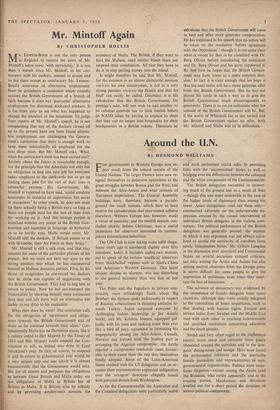Around the U.N.
By DESMOND WILLIAMS
EW governments in Western Europe now ex- r pect much from the annual session of the United Nations. The larger Powers have now re- signed themselves to defensive operations in the great struggles between Russia and the West, and between the Afro-Asians and what remains of 'European imperialism.' The General Assembly buildings have, therefore, become a parade- ground for small nations, which here at least receive the consideration that they cannot achieve elsewhere. Western Europe has, however, made a virtue of necessity; and the twelfth session, con- cluded shortly before Christmas, was a useful panorama for observers interested in contem- porary international behaviour.
The UN Club is now taking more solid shape. Some years ago it numbered slightly over fifty members; today it includes eighty-two nations, not to speak of the various 'unofficial' observers from 'blackballed' regions such as Mao's China and Adenauer's Western Germany. This latest session, despite its alarums, was less disturbing to the general harmony than was that of last year.
The Poles and the Jugoslays in private con- viviality were refreshingly frank about Big Brother; the Syrians spoke indiscreetly in respect of Russian arbitrariness in dictating attitudes to- wards Turkey. Japan surprised 'everyone by challenging Indian leadership in the Asiatic world, and Mr. Krishna Menon, equipped gal- lantly with his cane and looking more than ever like a bird of prey, succeeded in increasing his unpopularity among the Afro-Asians. Canada, Norway and Ireland took the leading part in arranging the Algerian compromise; the Arabs rejected a compromise regolution more favour- able to their cause than the one they themselves finally adopted. Some of the Latin-American States clashed with the US delegation and on oc- casion their representatives expressed indignation, over the 'arrogant' directives allegedly issued with personal threats from Washington.
As for the Commonwealth, the Australian and the Canadian delegations were particularly active and each performed useful roles in providing links with the 'uncommitted' States as well as bridging over the differences between the coloured and the white components of the Commonwealth.
The British delegation succeeded in recover- ing much of the ground lost as a result of Suez —though this was more noticeable in the case of the higher leyels of diplomacy than among the lower.. Asian delegations—and not these only— commented adversely on the unfavourable im- pression created by the casual intervention of individual British delegates in, the various com- mittees. The political performance of the British delegation was generally praised; the manner in which it was expressed was not always calcu- lated to soothe the sensitivity of members from newly 'independent States.' Mr. Gilbert Longden in the discussion over apartheid and Commander Noble on several occasions aroused criticism, not only among the Arabs and Asians but also among neutral observers from the foreign press. It seems difficult for some people to give the impression of politeness, even when they enter- tain the best of intentions.
The advance of democracy was evidenced by the attendance of female delegates from many countries, although they were usually relegated to the committees of lesser importance, such as that dealing with human rights. Earnest and serious ladies from Sweden and the Middle East vied with each other in reaching indeterminate and qualified resolutions concerning education and the death penalty.
Sound and fury often raged in the conference rooms; more sense and certainly more gaiety abounded around 'the corridors and in the dele- gates' dining-room and lounge. Here were found the professional lobbyists and the inevitable female journalists and representatives of non- governmental organisations. Politics were some- times forgotten—except among the Arabs (and the Russians, who rarely appeared); and in the evening parties, Manhattans and flirtations levelled out for a short period the divisions of serious political controversy.










































 Previous page
Previous page